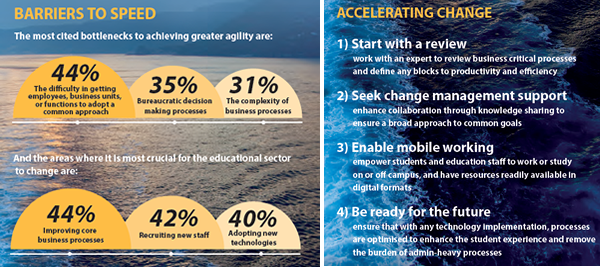European education leaders believe they need to change faster now than they have done over the last three years and almost all (98 per cent) say they are under pressure to adapt to rapid change.
However, in new study called The Challenge of Speed, conducted by the Economist Intelligence Unit and sponsored by Ricoh, Europe’s educationalists report that they are energised about the role of technology in the future of learning – a quarter highlighted augmented reality as one of the leading technologies able to improve their organisation’s performance and enhance student experience (compared with a mere five per cent from other sectors).
Instead, the key areas of concern to quickly changing for the future are focused on back office activity. The top two bottlenecks to achieving greater agility are difficulty in getting employees, business units, or functions to adopt a common approach (44 per cent) and bureaucratic decision making processes (35 per cent).
Carsten Bruhn, Executive Vice President, Ricoh Europe says, “There is an excitement in the education sector about the future of learning. The European Commission’s Opening Up Education initiative is driving the move towards open educational resources, including Massive Open Online Courses (MOOCs) and technology is enhancing the student experience. However, there is also an underlying pressure to deliver more, often with fewer resources, whilst remaining an attractive place of study. The research shows that the multiple levels of bureaucracy, layers of administrators and fragmented shared vision, is resulting in institutions continuing to function without any real change to operations. Unless addressed immediately, these bottlenecks can impact the wider, core goals for education establishments into the future.”
Executives have recognised the need for back office transformation to improve core functions which are often document and process-heavy. When asked to identify the areas where adapting to change was most crucial, their most cited responses were improving core business processes (44 per cent), recruiting new staff (42 per cent) and adopting new technologies (40 per cent). In addition, they also ranked these exact areas as those where they expect the most change over the next three years, demonstrating a belief that having the right processes, people and technology is essential to achieving fast speed.
The research also reveals that over two thirds of respondents (71 per cent) have experienced moderate to extreme disruption driven by technological change over the last three years. They are slightly more confident looking to the future, with 56 per cent envisaging the same level of disruption over the next three years. The reason for such optimism could be due to confidence that they will overcome their back office obstacles, and that more educational institutions are taking greater strides on their digital journeys, while the EU’s digital agenda – which calls on member nations to mainstream eLearning – is also helping them to navigate challenges.
Bruhn adds, “Executives clearly recognise that greater speed and efficiency are important. But while technology is opening up new horizons they must focus more on their core business processes and transform into truly digital and connected operations where education materials and essential administrative information is available in the right format at the right time. And speed of change is an important element, to ensure successful education programmes for the 21st century. The good news is that education leaders are not alone. Both government initiatives and private sector innovations are supporting executives as they strive to move forward.”
For More Information, Visit: www.ricoh-europe.com/thoughtleadership Download the full article and infographic and watch the video.
